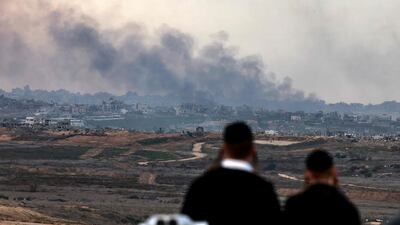Live updates: Follow the latest on Israel-Gaza
Israel intensified attacks on northern Gaza's Indonesian Hospital on Monday, leaving it out of service and trapping patients inside without food, water or a source of heat.
The grim report follows the destruction last month of Kamal Adwan Hospital, also in the north of the enclave. Israel forced patients and medics to leave the hospital during that operation, with more than 240 people detained, including the hospital's director, Dr Hussam Abu Safiya, whose whereabouts remain unknown.
“This past Saturday, the [Indonesian] hospital completely ceased operations and is no longer providing any services to patients, despite patients and others still being trapped inside," Dr Munir Al Bursh, general director of Gaza's Ministry of Health, told The National. “There are no medical supplies, electricity, water, or any other resources necessary to treat patients and provide them with adequate care."
The destruction of Kamal Adwan means it is vital that the Indonesian Hospital reopens. About 75,000 Gazans are at risk from the "systematic dismantling of the health system and a siege for over 80 days on north Gaza", the World Health Organisation said in December.
Most of the patients forced to leave Kamal Adwan moved to the Indonesian Hospital. Roaa Basala, 27, is among 23 people trapped inside the site, after she went there with her injured brother.
There are patients, their companions and medical staff inside the hospital, she told The National. She said she was worried about what would happen if they did not receive help quickly.
“The Israeli army has forced us to remain in the hospital after destroying Kamal Adwan Hospital a few days ago, providing us with no supplies, food, or water," she told The National.
Ms Basala said delegations from international NGOs visited the hospital and saw the scale of destruction and lack of resources. She said fires had burnt for days, while Israeli military vehicles remain outside – advancing and sometimes retreating from certain areas.
"We are hungry, thirsty and extremely cold," she added. "We don’t have enough blankets to protect us from the harsh winter and the heavy rain that has poured down in recent days.
"In the past few days, the army has detonated several explosive robots in the area, completely demolishing the remaining homes of civilians. We can’t move outside the hospital for any reason, as any movement could lead to immediate targeting and death, because the occupation [Israeli forces] monitors every movement inside and outside the hospital."
Rushdi Hamad, 31, is in the Tel Al Zaatar neighbourhood, near the hospital. “The army has burnt several homes and buildings in the vicinity and advanced its vehicles towards the hospital," he explained. "Fires continue to rage, with plumes of smoke still visible days after the burning incidents.
"Reaching the area to assess the damage is extremely dangerous, as Israeli drones target any movement in the vicinity. The occupation forces are systematically destroying what remains of civilian homes and infrastructure in northern Gaza. They have intensified these efforts, especially during the past day and night, using numerous explosive devices and robotic technologies to achieve their objective."


